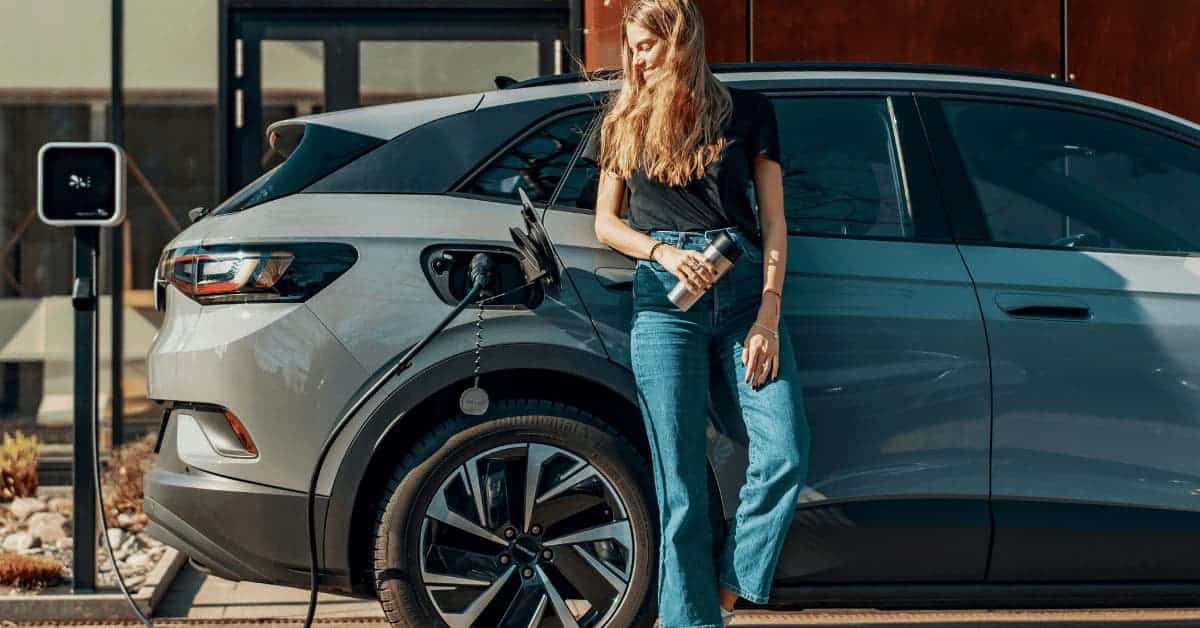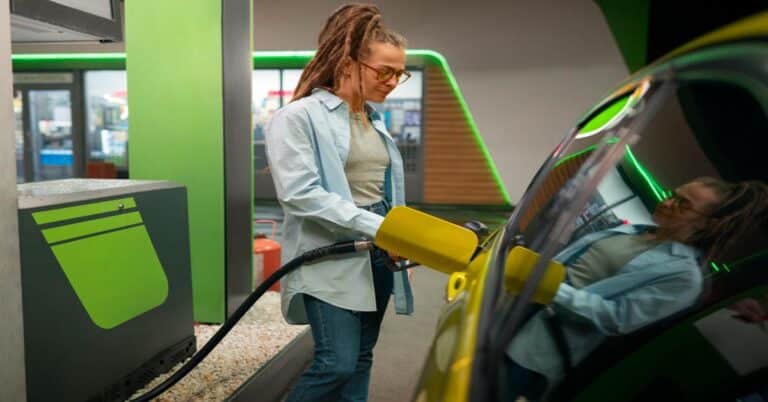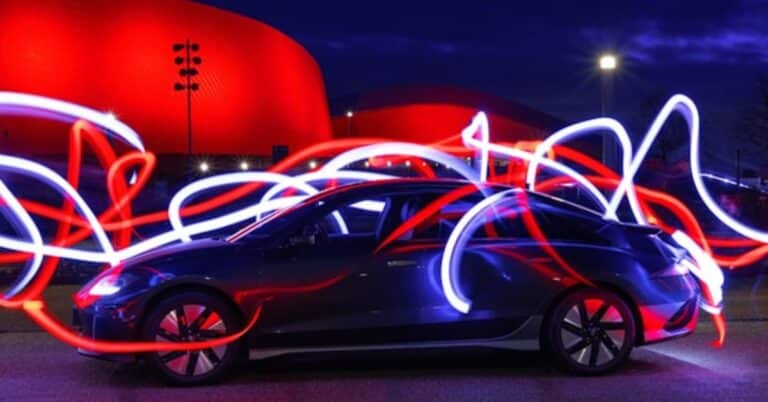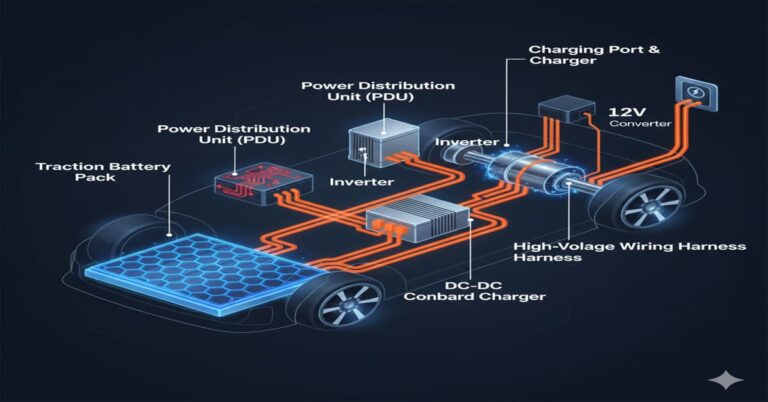How Long Do EV Batteries Last?
EVs are everywhere now, right? But the big question everyone asks is, how long do EV batteries last? Therefore, you need this information if you’re thinking of an electric car. Let’s break it down.
How Long Does an Electric Car Battery Last?
EV batteries typically last 8 to 15 years, although several factors can affect their lifespan. It depends on driving habits and the atmosphere. Battery maintenance is important. Most car makers offer warranties that cover at least 8 years or 100,000 miles.
Do Electric Car Batteries Degrade?
An EV battery declines with time, losing its capability to retain a full charge. While lower battery capacity is a given, it doesn’t necessarily mean your EV will stop functioning. Instead, the battery will likely continue working for several years, but with a decreased range.
For example, after 8-10 years, the EV range can drop from 300 to 250 miles. The decline raises concerns for many. But do not fret! Although you can still drive the car, the range will be lower at full charge.
EV Battery Degradation Chart
Years | Mileage (km) | Charge Cycles | Capacity Retention (%) | Health Status |
|---|---|---|---|---|
0–2 Years | 0–40,000 | 0–300 | 95–100% | Excellent |
3–5 Years | 40,001–100,000 | 301–800 | 85–94% | Good |
6–8 Years | 100,001–160,000 | 801–1300 | 75–84% | Fair |
8+ Years | 160,000+ | 1300+ | 65–74% | Degraded |
What Affects EV Battery Lifespan?
The lifespan of an electric vehicle battery depends on numerous factors. Here are some of them:
1. Driving Styles
If you drive aggressively or accelerate rapidly, your car battery will be strained, reducing its lifespan. Conversely, smooth driving with steady acceleration helps preserve battery health.
2. Climate Factors
High and extremely low temperatures may impact battery performance. A hot climate would make electric vehicle batteries age faster, and even extreme cold weather may temporarily reduce the driving range of electric vehicles.
3. Charging Techniques
Gradually, using fast charging features will degrade the battery. Use slow standard charging features whenever possible. Do not let your battery die below 20%, and do not charge it to 100% too often.
4. Type of Battery
Most electric vehicles use lithium-ion batteries, as they are durable and efficient. New technologies such as solid-state batteries promise longer lifespans.
What Shortens EV Battery Life?
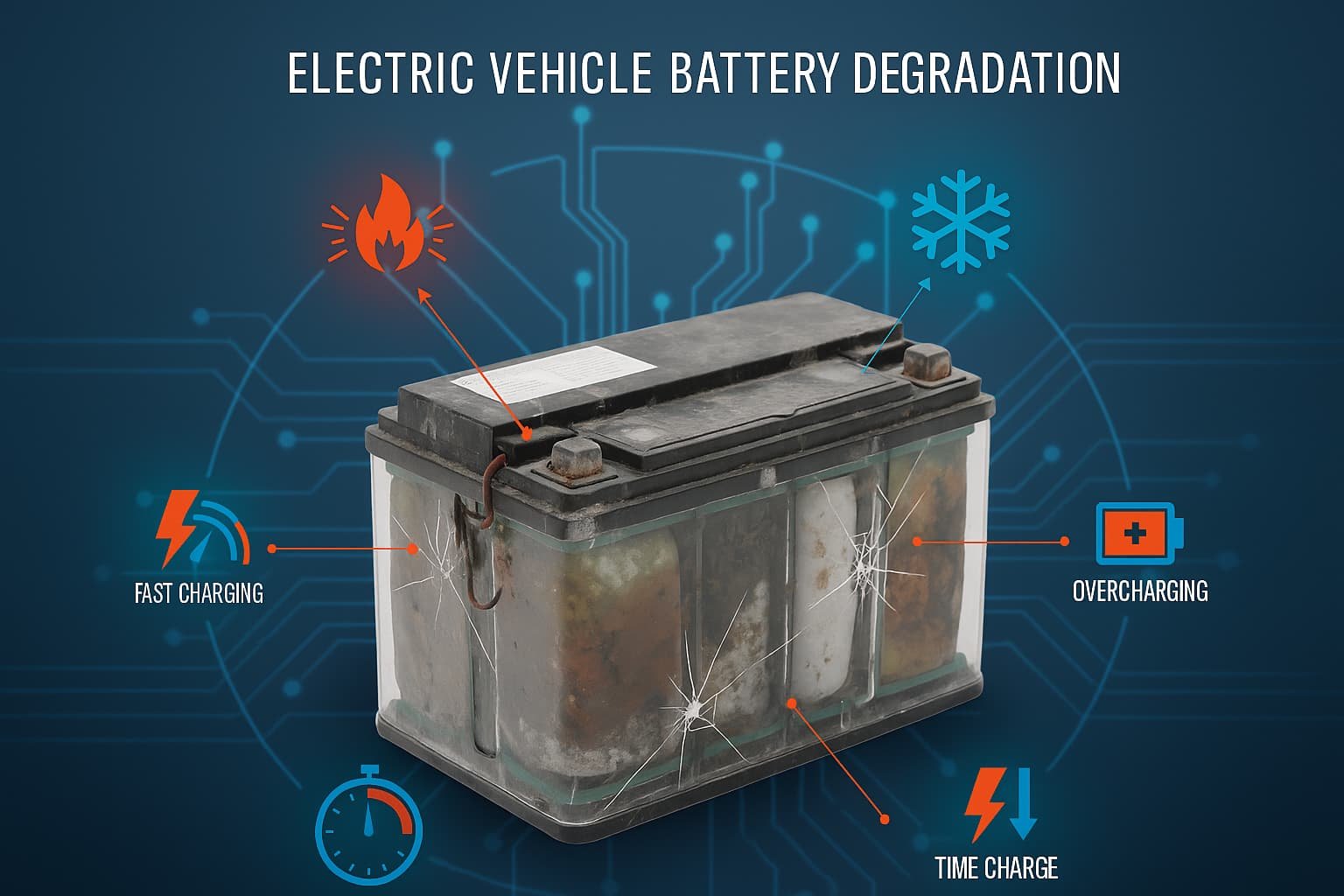
1. High State of Charge
Allowing a battery to consistently charge over the 80-90% threshold can fast-track degradation. Storing SoC at high voltage levels stresses the battery’s chemistry, causing a rapid loss of capacity. You should charge your device 80–90% daily to prevent capacity loss and save a full charge (100%) for lengthy travels.
2. Low State of Charge
Recurrent discharges to very low levels, like below 20%, can drain the battery and prove harmful in the long run. Similarly, deep discharges put undue stress on the battery and can reduce its life span. To avoid these caveats, keeping the charge above 20% is necessary to keep the battery in good health.
3. Fast Charging
If relied on too often, fast chargers can hasten battery degradation. Fast battery charging puts out a lot of heat and uses high current, further stressing the battery cells. Succumbing to fast charging renders the battery’s life shorter. It is better to use fast charging sparingly; slow Level 1 or Level 2 (AC) charging is much more efficient for day-to-day usage.
4. High Temperatures
Extended exposure to the sun and high ambient temperatures can damage the battery. Heat increases the rate of chemical reactions within the battery and thus accelerates the loss of capacity. One should always attempt to park in cool or shaded areas and utilize thermal management when available.
5. Low Temperatures
Cold temperatures can decrease the battery’s performance and capacity, but this decline will be temporary. Winter conditions slow chemical reactions and increase internal resistance. One way to counteract this is to pre-heat the battery while plugged in before heading out in the cold.
6. Discharge Cycles
Charging the battery to its maximum limit and then wholly draining it can result in a shortened battery life. While both complete and partial charge/discharge cycles stress the battery, complete cycles are more detrimental. For optimal stress management on the battery, use partial charging cycles for daily driving, where it remains in the 20% to 80% range.
7. Overheating During Charging or Driving
Excessive heat from the environment can cause overheating while charging, and aggressive driving can also overheat the battery. Too much heat will damage the battery’s internal components, reducing overall capacity. To keep the battery healthy, abstain from aggressive driving and cool the battery during charging.
8. Time
Even when not in use, an electric vehicle’s battery is constantly degrading and going through processes that slowly cause it to lose capacity. If the car isn’t going to be used for a long time, it should be stored at about 50% charge to slow down the rate of deterioration.
9. Frequent High-Power Requests
Towing, fast driving, and aggressive acceleration can strain a battery. All of these require a hefty amount of power, which causes the cells in the battery to heat up and become stressed. To maintain the battery’s health, one should strive to exercise smooth driving techniques and limit strenuous high-power activities.
10. Poor Thermal Management
Poor cooling or heating of the battery can cause it to degrade faster than usual. The ideal temperature is 20 to 30 degrees Celsius (68 and 86 degrees Fahrenheit). Ensure the car’s thermal management system works efficiently to ensure the battery performs at its best.
11. Manufacturing Faults or Poor Quality
Batteries can degrade due to manufacturing defects or if the battery is of poor quality. These cells tend to fail under pressure and, as a result, have a very short life span. Choosing EVs from reputable manufacturers with solid battery warranties is best to avoid relying on poorly manufactured batteries.
12. Software and Battery Management System (BMS) Issues
Battery management systems (BMS) that are outdated or poorly developed can lead to overheating, overcharging, or many other problems. Software bugs range from being merely irritating to destroying systems. The BMS is critical in managing the battery’s State of Health (SOH). Promptly address any issues related to the BMS, as it is important to maintain the vehicle’s software.
13. Physical Damage
Improper treatment of a battery pack, like an accident, puncture, or incorrect use, may significantly shorten its longevity more than fairly mishandled treatment. Physical accidents that inflict internal short circuits will present challenges in maintaining or improving battery performance. In other words, treat the vehicle correctly. Any damage should be dealt with immediately to be more proactive about these problems.
14. Excessive Use of Regenerative Braking
While regenerative braking improves efficiency, excessive use results in many small charge-discharge cycles, which may contribute to battery wear over time. Use regenerative braking moderately alongside traditional brakes.
15. Improper Storage
It can be damaged if the EV is stored with a fully depleted or charged battery for long periods. Specifically, keeping charge extremes while storing the EV will accelerate battery degradation due to chemical instability. Therefore, if you will not use the vehicle for a long time, storing the battery with a 50% charge is ideal.
Summary: EV batteries lose power for a few main reasons. Keeping the battery too full or too empty can weaken it. Using fast chargers often also shortens their life. When the battery gets too hot or too cold, it gets damaged. Other things that hurt the battery are draining it completely many times, letting it get too hot, and driving aggressively. To help your battery last longer, you should always keep the charge level between 20% and 80%. Try to avoid very hot or cold temperatures, and use the slow charger for daily charging. If you won’t drive the car for a long time, store it with a 50% charge.
Read more: How To Extend Electric Car Battery Life?
Does driving fast drain an EV battery?
Yes, fast driving does lead to higher energy consumption in an EV. Moving at high speeds causes the motor to draw additional power, which increases energy consumption. To make matters worse, heavy acceleration or attempting to maintain a high speed for a long time generates extra heat and more strain on the battery.
As a result, driving at moderate speeds enhances battery charge retention and increases the vehicle’s range.
Does AC Drain EV Battery?
Keeping the air conditioning (AC) on while driving an electric vehicle (EV) consumes battery power. Like any vehicle, an electric vehicle relies on its battery to operate the AC, which reduces the energy available for driving.
The rate at which the battery drains depends on various factors, such as the outside temperature and the intensity of AC usage. On hot days, the battery has to work harder to cool the cabin, significantly reducing the vehicle’s battery life.
Is DC Charging Bad For EVs?
One of the most common questions is, “Is DC charging bad for EVs?” The short answer is no, it’s not inherently bad, but it’s something you should use judiciously. DC fast charging, sometimes called Level 3 charging, is a super-speedy way to replenish your battery.
It sends direct current (DC) power straight to the battery, bypassing the conversion process that happens with typical AC chargers (Levels 1 and 2). Those chargers convert alternating current (AC) to DC within the car, while DC fast chargers handle that conversion externally.
What is the Best Speed for EV Driving to Save Battery?
Want to extend the life of your EV’s battery? Drive at a moderate speed. Research shows that 30 to 50 mph is ideal. At this speed, your car uses less energy, fights less air resistance, and drains your battery more slowly.
Here are some tips for maximizing battery efficiency:
- Maintain a Steady Speed: Avoid fast starts and hard stops. Use cruise control on the highway.
- Reduce Speed: Driving a little slower saves energy.
- Minimize Air Conditioning: AC uses a lot of battery power. Use it only when necessary.
- Plan Your Route: Pick routes with fewer hills. Less traffic is also better.
Do Electric Cars Last Longer Than Petrol Cars?
Electric cars (EVs) and petrol cars differ significantly in how they work and how long they last. Many people wonder which type of car lasts longer.
Electric Car Lifespan
Electric cars use batteries and electric motors. These have fewer moving parts than petrol engines, which means wear and tear. EV batteries typically last 8 to 15 years, but good batteries can make them last even longer.
Petrol Car Lifespan
Petrol cars have internal combustion engines with many moving parts that wear out over time. Regular maintenance is essential for longevity, and a well-maintained petrol car can last up to 20 years.
Which is More Durable?
Electric cars often have an edge in mechanical durability and are Also More Durable in design than petrol cars. However, EV batteries do degrade. Battery degradation can affect the car’s range and performance, a key factor in EV lifespan.
How Long Do Tesla Batteries Last?
Tesla batteries are built to last, and most Tesla owners say they function optimally for about 10-15 years. Tesla’s warranty guarantees at least 70% capacity after 8 years or 100,000-150,000 miles.
With the proper care and maintenance, some Tesla batteries have accumulated minimal degradation over 300,000 miles. Proper care and maintenance play a huge role in achieving this.
How Long Do Kia EV Batteries Last?
Kia EV models such as the Niro and EV6 are equipped with advanced batteries that last, on average, 10-12 standard years of usage. Kia offers a 10-year or 100K mile warranty to back their claim.
Final Thoughts
Electric car batteries typically last 8 to 15 years, but their lifespan depends on several factors. Driving habits, climate, charging techniques, and battery maintenance play a role. While EV batteries degrade over time, losing some capacity, they often continue functioning well for many years.
To maximize your EV battery’s life, drive smoothly, avoid extreme temperatures, and use slow charging when possible. Keep the battery charge between 20% and 80% for daily use. Fast charging and aggressive driving can shorten battery life, so use them sparingly.
Due to their more straightforward design, electric cars generally have fewer mechanical issues than petrol cars. However, battery degradation is a factor to consider. With proper care, EVs can offer a durable and eco-friendly driving experience.
Whether you choose an electric or petrol car, understanding how to care for it will help you get the most out of your vehicle. Drive smart, maintain your car well, and enjoy the journey!
Detailed information about: How To Charge Electric Car?

